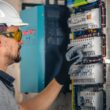Welcome to our comprehensive guide on the intriguing reaction between zinc (Zn) and copper sulfate (CuSO4). This chemical reaction has garnered significant attention due to its fascinating properties and applications. Let’s delve into the details of this reaction, exploring its mechanisms, significance, and various aspects.
The Basics of the Zn CuSO4 Reaction
The Zn CuSO4 reaction refers to the process in which zinc metal reacts with copper sulfate, a soluble salt composed of copper, sulfur, and oxygen. The reaction is known for its visually captivating transformations, making it a popular choice for educational demonstrations and experiments.
The chemical equation representing the reaction is:
Zn + CuSO4 → ZnSO4 + Cu
Understanding the Mechanism
This reaction involves a displacement or single-replacement reaction, a type of redox reaction where one element displaces another element from a compound. In this case, zinc displaces copper from the copper sulfate compound. The zinc atoms lose electrons and are oxidized, while copper ions gain electrons and are reduced. This exchange of electrons is a fundamental characteristic of redox reactions.
Significance of the Reaction
The Zn CuSO4 reaction holds significance in various fields, including chemistry education, industrial applications, and metallurgy. Some key points of importance include:
- Education: The reaction provides a hands-on illustration of redox reactions and the reactivity series of metals.
- Galvanization: Zinc-coating (galvanization) is a method employed to protect iron and steel surfaces from corrosion. This process relies on the reaction between zinc and CuSO4 to apply a protective zinc layer.
- Electrochemistry: The reaction plays a role in electrochemical cells, where the exchange of electrons between zinc and copper ions generates electrical energy.
Exploring Reaction Variations
While the basic reaction involves zinc and copper sulfate, variations exist depending on factors such as concentration, temperature, and the presence of catalysts. These factors influence the rate of the reaction and the nature of the products formed.
Frequently Asked Questions (FAQs)
Q: What is the purpose of the Zn CuSO4 reaction?
A: The reaction serves educational purposes, as a protective measure in galvanization, and contributes to electrochemical processes.
Q: Can this reaction be reversed?
A: Yes, the reaction can be reversed using appropriate conditions and electrodes to regenerate zinc and copper sulfate from zinc sulfate and copper.
Q: Are there safety concerns associated with this reaction?
A: While the reaction is generally safe for educational demonstrations, it’s essential to follow safety guidelines, such as wearing appropriate protective gear and conducting the reaction in a controlled environment.
In Conclusion
The Zn CuSO4 reaction remains a captivating example of redox chemistry, with applications spanning from educational demonstrations to industrial processes. Understanding the underlying mechanisms and significance of this reaction contributes to a broader comprehension of chemical processes and their real-world applications.




